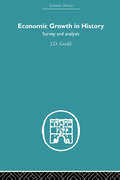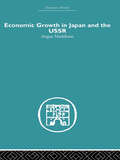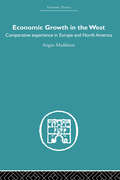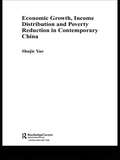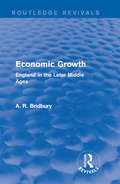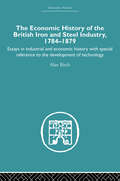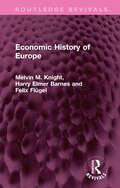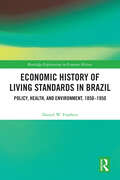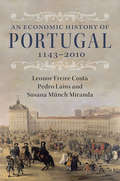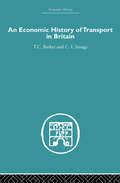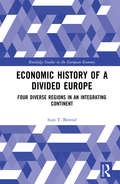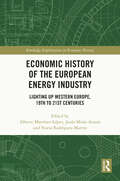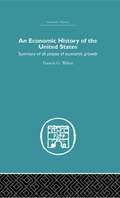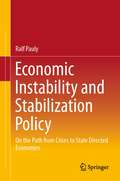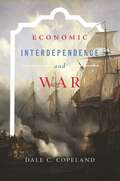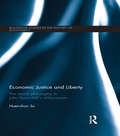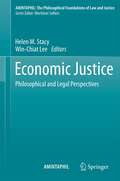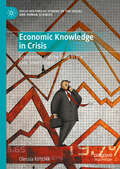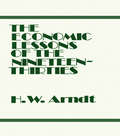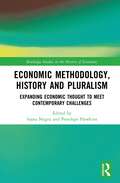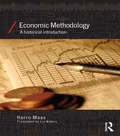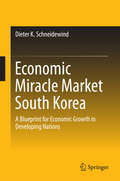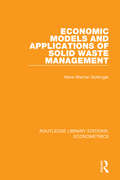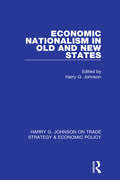- Table View
- List View
Economic Growth in History: Survey and Analysis
by J.D. GouldThis book breaks fresh ground in the most challenging aspect of economics and economic history – the nature of economic growth. Professor Gould considers a wide range of theories about growth and its causes, and examines these theories in the light of modern economic history. The first chapter sketches the historical experience of growth in its broad contours. There follow discussions of the contribution made by agriculture, savings and investment, foreign trade, industrialization, technological change and a number of ‘residual’ elements. A final chapter offers a critical survey of several leading theories of economic development, judged in the light of actual historical experience. Throughout, the author has chosen to test theories rather than to deploy data of historical change and then induce theory from it. Often the result is somewhat discouraging, either because historical reality proves to be too complex to be adequately explained by even a sophisticated ‘theory’, or because practical difficulties make it impossible to subject the theory in question to a satisfactory test. Yet economists no less than economic historians will value the exercise for removing so many confusions from the study of development economics. Professor Gould’s highly readable style and avoidance of unnecessary jargon ensure that his book will be readily accessible to all those interested in problems of global poverty and economic development. This book was first published in 1972.
Economic Growth in Japan and the USSR
by Angus MaddisonIn terms of output, the USSR and Japan account for one-fifth of the world's economy, occupying second and third places behind the United States. Japan has the world's fastest growth of per capita income and the USSR has not lagged far behind. But a century ago they were static feudal societies. This study analyzes the policies which enabled them to transform their economies adn to catch up with the developed world. The strategies of the two nations adopted have been very different: Japan has maintained small farms and factories, developed a labor-intensive technology, and has successfully penetrated the world export markets. The USSR, on the other hand, has created giant farms and factories adn remained fairly isolated from world trade. Since 1945 teh USSR has devoted one-eighth of her resources to military purposes, Japan practically nothing. In Economic Growth in Japan and the USSR, Angus Maddison offers a comparative analysis of the growth experience of these two countries that greatly enlarges our knowledge of the development process. A better understanding of their past experience can be particularly illuminating and relevant for economic policy in developing countries today. This classic text was first published in 1969.
Economic Growth in the West: Comparative Experience in Europe and North America
by Angus MaddisonHailed a "an outstanding contribution to our knowledge of the way in which western economies work" [Times Literary Supplement], this penetrating study of economic growth compares and analyzes tic rates of economic advance in the twelve leading countries that comprise the industrial West. Mr. Maddison examines why, after relative stagnation for several decades, the rate of economic development accelerated in continental Europe in the 1950’s, whether this represented a new economic pattern which could be maintained or was only a passing phase of recovery after World War II. He observes that the economies of North America and the United Kingdom seemed by comparison almost to stand still, and he explores the influence of economic policy on the differing growth rates, and the growth potentials and desirable lines of policy in the industrial West. He then discusses the major powers’ policy problems, whose outcome so closely affects the developing nations. Mr. Maddison presents basic statistical series, going back to 1870 in most cases, on gross national products, productivity, population, labor force, employment, working hours, investment and capital-output ratios. He draws upon this rich fund of comparative statistics with skill and insight, relating it throughout to the broad questions of economic policy which are at issue. This classic book was first published in 1964.
Economic Growth, Income Distribution and Poverty Reduction in Contemporary China (Routledge Studies on the Chinese Economy #Vol. 13)
by Shujie YaoChina has experienced over a quarter century of rapid economic growth, which has had a phenomenal impact on the global economy. Entering into the twenty-first century implies that China has begun a new phase of economic and social development. Yao reviews the economic development history of contemporary China from 1949 to the present, paying special attention to growth, inequality and poverty reduction. A real Chinese economic miracle should have two important features: high income growth and a fair distribution system so that poverty can be eradicated.
Economic Growth: England in the Later Middle Ages (Routledge Revivals)
by A. R. BridburyFirst published in 1962, this book challenges the notion that the later Middle Ages failed to sustain the economic growth of earlier centuries, suggesting that historians have been preoccupied with absolute levels of output over more important questions of output per head. It also argues they have ignored the disastrous fall in living standards in the thirteenth century and the astonishing rise that occurred later. Using national taxation records and records of urban government, as well as research from fields ranging from parliamentary history to statistics of foreign trade, the author attempts to establish that the later Middle Ages has also been wrongly defamed in political affairs.
Economic HIstory of the British Iron and Steel Industry
by Alan BirchThis book was first published in 1967. This volume explores the history of the British iron and steel industry from 1760, tracking its development, relationship with the British economy, regional hubs, technological developments and the final triumph of steel over iron.
Economic History of Europe (Routledge Revivals)
by Harry Elmer Barnes Melvin M. Knight Felix FlügelOriginally published in 1930, this book is a detailed but lucid piece of historical writing which answers many questions about ancient and medieval history that are most important for understanding contemporary economic problems. The economic history of Europe in modern times is both the history of agriculture, industry and commerce of a continent over 5 centuries and the history of a series of changes in economic organization which have been dominant in making the modern world what it is. This book gives due weight to both of these aspects. As well as being an account of sequences of events, it is also an account of changing forms of economic activity, alterations of the economic structure of society and emerging economic problems in the 20th Century.
Economic History of Living Standards in Brazil: Policy, Health, and Environment, 1850–1950 (Routledge Explorations in Economic History)
by Daniel W. FrankenIncorporating political, economic, and environmental factors, this book explores the evolution of health and living standards in Brazil in the nineteenth and twentieth centuries. It draws on anthropometric data and an interdisciplinary approach to illuminate the profound socioeconomic transformations that unfolded in Brazil during this period.Through an analysis of archival military and passport records, the book reveals an increase in heights starting in the 1880s, predating the Vargas Era’s economic growth and social reforms. It also offers novel insights into Brazil’s regional development divide, showing that regional height differentials existed as early as the mid-nineteenth century (before industrialization began in earnest). Innovative methods, such as surname sorting to study immigration and merging anthropometric data with historical weather records to study the link between climate and health, are introduced. Qualitative evidence on municipal-level clean water and sewage interventions, along with data on malaria and hookworm disease, further corroborate the observed longitudinal trends and spatial patterns in stature.Scholars and students of historical anthropometrics, living standards, and Brazilian history will find this book essential, as will those with a broader interest in Latin American or economic history.
Economic History of Portugal, 1143–2010
by Pedro Lains Leonor Freire Costa Susana Münch MirandaThis book offers a fascinating exploration of the evolution of the Portuguese economy over the course of eight centuries, from the foundation of the kingdom in 1143, when political boundaries began to take shape in the midst of the Christian Reconquista of the Iberian Peninsula, and the formation of an empire, to the integration of the nation into the European Communities and the Economic and Monetary Union. Through six chapters, the authors provide a vibrant history of Portugal's past with a focus ranging from the medieval economy and the age of globalization, to war and recovery, the Atlantic economy, the rise of liberalism and patterns of convergence. The book provides a unique long-term perspective of change in a southern European country and its empire, which responds to the fundamental broader questions about when, how and why economies expand, stagnate or contract.
Economic History of Transport in Britain
by Christopher Savage T.C. BarkerPublished in 2005, Economic History of Transport Britain is a valuable contribution to the field of Economic History.
Economic History of a Divided Europe: Four Diverse Regions in an Integrating Continent (Routledge Studies in the European Economy)
by Ivan T. BerendThis book presents the sharp regional diff erences within the integrating European continent. Four regions – Northwestern Europe, Southern Europe, Central Europe, and Eastern-Southeastern Europe – represent high, medium, and relatively less-developed levels of economic advancement. These disparities have emerged as a result of historical diff erences that produced and reinforced cultural and behavioral diff erences. The author examines the distinctions between the regions, looks at how these differences transpired and became so retrenched, and answers the question of why some countries were able to elevate to higher levels of economic development while others could not. This book is unique in that it provides a timely historical analysis of the main causes of the most pressing conflicts in Europe today. Readers will come away from this book with a deeper understanding of the sharp divergence in economic standing between the four different regions of Europe, as well as knowledge about how institutional corruption and other cultural features exacerbated these variations. The book also offers a better understanding of major European Union confl icts between member countries and between member and nonmember countries, as well as the rise of autocratic regimes in certain countries. The book begins with a short history of European integration throughout European civilization and then goes on to discuss the modern reality of integration and attempts to homogenize the Continent that divided into four different macro-regions. It will primarily appeal to scholars, researchers and students studying Europe from various fi elds, including economics, business, history, political science, and sociology, as well as a general readership interested in Europe’s past, present, and future.
Economic History of the European Energy Industry: Lighting up Western Europe, 19th to 21st centuries (Routledge Explorations in Economic History)
by Jesús Mirás-Araujo Alberte Martínez-López Nuria Rodríguez-MartínGlobal climate change and the war in Ukraine have put energy back on the agenda for Europe in a way that has not been seen since the oil crisis of the 1970s. But the economics and business of supplying energy to Europe has a long and rich history going back to the nineteenth century. This book explores changes in energy markets, strategies, firms and investments during the nineteenth and twentieth centuries. The primary focus is on manufactured gas—the gas that was initially produced from coal distillation until new ways of manufacturing gas emerged after the Second World War.The expert contributors to this volume draw on their extensive research and utilise primary sources to explore a wide range of issues, including technological adaptation, market regulation, energy investments (particularly the role of foreign capital), gas consumption and supply issues. The case studies are particularly drawn from Spain, France and Italy, but the authors provide a comparative and global perspective to consider the wider context. The volume closes with an epilogue that brings the story into the present day to consider current issues affecting gas markets in the EU, including war, geostrategy and pipelines.This book will be of interest to readers in economic history, business history, energy history, the history of public utilities and modern European history more broadly.
Economic History of the United States
by Francis G. WalettFirst Published in 2005. Routledge is an imprint of Taylor & Francis, an informa company.
Economic Instability and Stabilization Policy: On the Path from Crises to State Directed Economies
by Ralf PaulyThis book pleads for a new orientation of government economic policy, as well as central bank policy, rejecting the traditional government stabilization policy that leads to a dead-end of economic instability and social inequality in the long run.Growing economic instability and increasing state stabilization characterize the development of the capitalist market economy since the major world economic crises of the last century. The book examines these crises and the measures states take to overcome them. Additionally, it addresses the effectiveness and consequences of state intervention. In presenting the main features of Keynes’ and Minsky’s macroeconomics, the book provides a conceptual basis for an outlook on government stabilization in a changing market economy. It thus also offers a suitable framework for current economic policy discussions. Finally, the book examines the wider context of economic history for lessons to be learned.This book is a must-read for scholars and students of economics, as well as policy-makers and practitioners, interested in a better understanding of macroeconomics, central bank policy, and the results of state intervention.
Economic Interdependence and War (Princeton Studies in International History and Politics #148)
by Dale C. CopelandDoes growing economic interdependence among great powers increase or decrease the chance of conflict and war? Liberals argue that the benefits of trade give states an incentive to stay peaceful. Realists contend that trade compels states to struggle for vital raw materials and markets. Moving beyond the stale liberal-realist debate, Economic Interdependence and War lays out a dynamic theory of expectations that shows under what specific conditions interstate commerce will reduce or heighten the risk of conflict between nations.Taking a broad look at cases spanning two centuries, from the Napoleonic and Crimean wars to the more recent Cold War crises, Dale Copeland demonstrates that when leaders have positive expectations of the future trade environment, they want to remain at peace in order to secure the economic benefits that enhance long-term power. When, however, these expectations turn negative, leaders are likely to fear a loss of access to raw materials and markets, giving them more incentive to initiate crises to protect their commercial interests. The theory of trade expectations holds important implications for the understanding of Sino-American relations since 1985 and for the direction these relations will likely take over the next two decades.Economic Interdependence and War offers sweeping new insights into historical and contemporary global politics and the actual nature of democratic versus economic peace.
Economic Justice and Liberty: The Social Philosophy in John Stuart Mill’s Utilitarianism (Routledge Studies in the History of Economics #157)
by Huei-chun SuThis new book reopens the debate on theories of justice between utilitarian theorists and scholars from other camps. John Rawls’ 1971 publication of A Theory of Justice put forward a devastating challenge to the long-established dominance of utilitarianism within political and moral philosophy, and until now no satisfactory and comprehensive utilitarian reply has yet been put forward. By expounding John Stuart Mill’s system of knowledge and by reconstructing his utilitarianism, Huei-chun Su offers a fresh and comprehensive analysis of Mill’s moral philosophy and sheds new light on the reconciliation of Mill’s idea of justice with both his utilitarianism and his theory of liberty. More than a study of Mill, this book uses a systematic framework to draw a comparison between Mill’s theory of justice and those of John Rawls, Amartya Sen, and Friedrich von Hayek. It hence establishes common ground between different schools of thought in the fields of economics and philosophy, and enables more effective dialogue. This book will be indispensable both to those interested in Mill’s moral philosophy and to those seeking a solid theoretical basis for analyzing the idea of justice, as well as to anyone with an interest with the history of economics, economic philosophy and the history of economic thought more generally.
Economic Justice: Philosophical and Legal Perspectives
by Helen M. Stacy Win Chiat LeeThe economic impact of the U. S. financial market meltdown of 2008 has been devastating both in the U. S. and worldwide. One consequence of this crisis is the widening gap between rich and poor. With little end in sight to global economic woes, it has never been more urgent to examine and re-examine the values and ideals that animate policy about the market, the workplace, and formal and informal economic institutions at the level of the nation state and internationally. Re-entering existing debates and provoking new ones about economic justice, this volume makes a timely contribution to a normative assessment of our economic values and the institutions that active those norms. Topics covered by this volumes essays range from specific or relatively small-scale problems such as payday lending and prisoners' access to adequate healthcare; to large-scale such as global poverty, the free market and international aid. Economic Justice will stimulate and provoke philosophers, policy makers, the engaged readers who and better outcomes from financial institutions and more effect distribution of economic goods.
Economic Knowledge in Crisis: Economists and the State in the Late Soviet Union (Socio-Historical Studies of the Social and Human Sciences)
by Olessia KirtchikThis book aims to shed new light on the puzzle of the late Soviet conversion to the “market” and capitalism by revisiting the history of Soviet reform economics. Using a variety of sources, including interviews with economists, archival files, and published materials, it examines the social contexts in which economists employed in economic administration and research institutions could have played a crucial public and political role, the forms of their participation, and the social and political logic behind the selection of economic experts and their rise to power during perestroika and the “transition” period. It also compares the professional trajectories of these reformist economists and assesses the scope of this group’s influence in the post-Soviet period in order to conclude on the new state of economic expertise in Russia.
Economic Lessons of the 1930s (Modern Revivals In Economic History Ser.)
by H. W. ArndtFirst Published in 1963. Routledge is an imprint of Taylor & Francis, an informa company.
Economic Methodology, History and Pluralism: Expanding Economic Thought to Meet Contemporary Challenges (Routledge Studies in the History of Economics)
by Ioana Negru Penelope HawkinsEconomic Methodology, History and Pluralism: Expanding Economic Thought to Meet Contemporary Challenges pays tribute to Emeritus Professor Sheila Dow (University of Stirling, Scotland). This volume focusses on the contributions of Dow to economic methodology, pluralism and the history of economic thought. These explorations serve to underpin her ideas and theories on macroeconomics, banking and money. Bringing together an impressive panel of contributors, the chapters in this work examine Dow’s writings on structured pluralism and schools of thought, meanings of open and closed systems, reflections on the relationship between economics and other sciences (both social and natural), the methodology of behavioural economics, as well as the political economy of the Scottish school of thought. The book challenges the foundations of the mainstream economics paradigm in a novel and holistic manner, seeking to advance thinking across Dow’s favoured discipline. The essays in this collection provide thought-provoking reading for advanced students and scholars of economic methodology, the history of economic thought, heterodox economics and political economy. The book will also be valued by the economics profession at large, as it contains important elements and ideas concerning ethics, methodology and tolerance within economics as a discipline and as a profession.
Economic Methodology: A Historical Introduction (Economics as Social Theory #35, Part A)
by Harro MaasEver since the inception of economics over two hundred years ago, the tools at the discipline’s disposal have grown more and more more sophisticated. This book provides a historical introduction to the methodology of economics through the eyes of economists. The story begins with John Stuart Mill's seminal essay from 1836 on the definition and method of political economy, which is then followed by an examination of how the actual practices of economists changed over time to such an extent that they not only altered their methods of enquiry, but also their self-perception as economists. Beginning as intellectuals and journalists operating to a large extent in the public sphere, they then transformed into experts who developed their tools of research increasingly behind the scenes. No longer did they try to influence policy agendas through public discourse; rather they targeted policymakers directly and with instruments that showed them as independent and objective policy advisors, the tools of the trade changing all the while. In order to shed light on this evolution of economic methodology, this book takes carefully selected snapshots from the discipline’s history. It tracks the process of development through the nineteenth and twentieth centuries, analysing the growth of empirical and mathematical modelling. It also looks at the emergence of the experiment in economics, in addition to the similarities and differences between modelling and experimentation. This book will be relevant reading for students and academics in the fields of economic methodology, history of economics, and history and philosophy of the social sciences.
Economic Miracle Market South Korea
by Dieter K. SchneidewindThis book explores the historical and economic development of South Korea, its culture, as well as the benefits, opportunities and challenges that German companies have faced in their cooperation with South Korean enterprises. More specifically, it juxtaposes economic-miracle markets such as Japan and West Germany, which rose from the ashes after the Second World War with the help of a century of bustling industrial age, with South Korea, which developed from virtually nothing. The book also addresses why South Korea's history, geography, society, culture and economic capabilities remain widely unknown and unnoticed among westerners, despite South Korean companies being among the global market leaders in a number of industries, particularly in the automobile and hardware segments. Written from the point of view of a seasoned business expert on the country, Economic Miracle Market South Korea is essential reading for business and economics research academics looking to improve their knowledge of this relatively unknown "success story", as well as for practitioners in industry looking to optimize their dealings with South Korean business partners.
Economic Models and Applications of Solid Waste Management (Routledge Library Editions: Econometrics #6)
by Hans-Werner GottingerOriginally published in 1991. The dilemma of solid and hazardous waste disposal in an environmentally safe manner has become a global problem. This book presents a modern approach to economic and operations research modelling in urban and regional waste management with an international perspective. Location and space economics are discussed along with transportation, technology, health hazards, capacity levels, political realities and the linkage with general global economic systems. The algorithms and models developed are then applied to two major cities in the world by way of case study example of the use of these systems.
Economic Nationalism in Old and New States (Harry G. Johnson on Trade Strategy & Economic Policy #2)
by Harry G. JohnsonOriginally published in 1968, this book brings together contributions from social scientists in anthropology, economic history, economics and political science in an exploration of the nature and effects of economic nationalism. The opening essays presents a formal theory of nationalism that relates the phenomenon to rational government processes. Following chapters explore whether nationalism and economic development went together and whether nationalistic economic polices actually promoted development. How far British economic policy was influence by nationalism, or its corollary for a successful country-imperialism is also assessed. Examples from China, Mali, Mexico and Canada are included.
Economic Origins of Dictatorship and Democracy
by Daron Acemoglu James A. RobinsonThis book develops a framework for analyzing the creation and consolidation of democracy.
